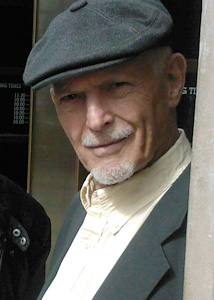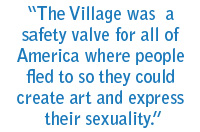 Poet and author Edward Field was born in Brooklyn in 1924. His books of poetry include “Magic Words: Poems,” “Counting Myself Lucky,” and “Stand Up, Friend, with Me,” which won the 1962 Lamont Poetry Prize. Under the pseudonym of Bruce Elliot, Field has also collaborated on several popular novels with his life partner of fifty years, Neil Derrick, with whom he shares a home in Westbeth.
Poet and author Edward Field was born in Brooklyn in 1924. His books of poetry include “Magic Words: Poems,” “Counting Myself Lucky,” and “Stand Up, Friend, with Me,” which won the 1962 Lamont Poetry Prize. Under the pseudonym of Bruce Elliot, Field has also collaborated on several popular novels with his life partner of fifty years, Neil Derrick, with whom he shares a home in Westbeth.
It was while on a three-day train trip in basic training during WWII that poet Edward Field discovered his life’s work and joy. “I was in the Army Air Corps and a Red Cross worker gave me a paperback,” he recalls. “It was an anthology of great poems. I read it the entire trip and when I got off the train I knew I was going to be a poet. I had never known what I wanted to be before. I couldn’t imagine what to do with my life but when I read that book I knew: ‘Poetry!’”
“Later on I was stationed in England,” he continues. “While in the Officers’ Club one night I met a poet, an officer. He told me about all these other poets he knew in London and I started reading modern poetry. I discovered there was a whole world of living poets out there as well.”
After his war service, Field attended NYU on the GI Bill but dropped out after two years. “I headed for the Left Bank in Paris,” he says. “It seemed the nicest place to go at the time, the most stimulating and friendly to budding poets. It was much easier as a gay man as well. I spent a year in Europe, but it was very hard to get work and I had no money so I came back to the States.”
The ensuing decade here turned out to be a struggle as well. “The 50s were a very difficult time in America,” Field says. “I think being a Lefty made it hard because you felt you were against where America was going. I wasn’t a member of the Communist Party, but it was still very hard to get a job because I couldn’t do anything. So I had a lot of little jobs and I kept writing. Of course I was crazy from the war as well. I think if you go into combat you don’t come out of it unscathed. I was in a lot of therapy in the fifties. Then I met my partner, Neil, and that’s what really saved my life.”
It was in 1962 that Field had his big break professionally. “My manuscript for a book of poems was rejected 25 times before it won the Lamont Award,” he says. “Then Grove Press published it as Stand Up, Friend, With Me. It received excellent reviews and it changed my life. It was wonderful to finally find my work. I also was able to travel the country giving poetry readings and I earned a living doing it.”
 For Field, being in the West Village for many decades means that the past is constantly present. “When I walk through the Village, I really walk down a memory lane,” he says. “I know what the old shops were before Marc Jacobs moved in. I hear the sounds of the old Village. There used to be typewriters clacking from windows as writers wrote their novels. There were violinists practicing, sopranos trilling away, and guys walking around with paint-covered Levis. It’s all here in my memory and consequently very real.”
For Field, being in the West Village for many decades means that the past is constantly present. “When I walk through the Village, I really walk down a memory lane,” he says. “I know what the old shops were before Marc Jacobs moved in. I hear the sounds of the old Village. There used to be typewriters clacking from windows as writers wrote their novels. There were violinists practicing, sopranos trilling away, and guys walking around with paint-covered Levis. It’s all here in my memory and consequently very real.”
However, Field acknowledges that it’s a world that has changed utterly in every way except externally. “The buildings are still the same ones that have always been here,” he says. “But everything else has changed due to economics. Fortunately, when the Village went upscale, Westbeth was here for us artists to move into. It was a way to keep us here. We’re the survivors, the last of the artists in the Village.”
When asked if he has any hopes for the future of the West Village, Field candidly admits, “Well, I won’t be here that much longer.” Then he thinks for a moment. “But if a place like Westbeth can survive,” he continues, “it will be good for keeping alive the memory of what the Village was: a safety valve for all of America where people fled to so they could create art and express their sexuality. In every sense it was a whole radical world when the rest of the country was devoted to business, respectability, and morality. The Village was the place of ideas.”
Photo: Neil Derrick
